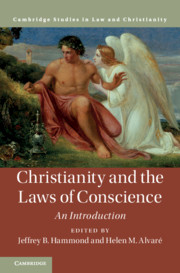Book contents
- Christianity and the Laws of Conscience
- Law and Christianity
- Christianity and the Laws of Conscience
- Copyright page
- Dedication
- Contents
- Contributors
- Acknowledgments
- Introduction
- Part I Themes in Understandings of Conscience in Christianity
- Part II Conscience According to Major Figures and Traditions
- Part III Applied Topics in Law and Conscience
- 15 Liberty of Conscience, Free Exercise of Religion, and the US Constitution
- 16 Religious Conscience Protections in American State Constitutions
- 17 Forced Conformity or Accommodation?
- 18 Christian Conscience and Sexual Expression Rights
- 19 Conscience and the Roman Catholic “Just War” Tradition
- 20 Institutional Conscience, Corporate Persons, and Hobby Lobby
- 21 Religion, Conscience, and the Law
- Index
- References
18 - Christian Conscience and Sexual Expression Rights
from Part III - Applied Topics in Law and Conscience
Published online by Cambridge University Press: 12 June 2021
- Christianity and the Laws of Conscience
- Law and Christianity
- Christianity and the Laws of Conscience
- Copyright page
- Dedication
- Contents
- Contributors
- Acknowledgments
- Introduction
- Part I Themes in Understandings of Conscience in Christianity
- Part II Conscience According to Major Figures and Traditions
- Part III Applied Topics in Law and Conscience
- 15 Liberty of Conscience, Free Exercise of Religion, and the US Constitution
- 16 Religious Conscience Protections in American State Constitutions
- 17 Forced Conformity or Accommodation?
- 18 Christian Conscience and Sexual Expression Rights
- 19 Conscience and the Roman Catholic “Just War” Tradition
- 20 Institutional Conscience, Corporate Persons, and Hobby Lobby
- 21 Religion, Conscience, and the Law
- Index
- References
Summary
Helen Alvaré chronicles tension between Christian individuals and institutions, and laws promoting sexual expression rights. Church and state used to share outlooks on these matters. Today, laws often mandate cooperation with behaviors opposed to Christian teachings on abortion, contraception, or same-sex relationships. State and certain private groups claim that new laws are necessary to secure interests such as dignity, equality, privacy, and personal identity. These laws are reinforced by cultural movements pressing individual autonomy and sexual freedom. Corporations and media have favored sexual expression protections and have discouraged exemptions for religious conscience. Christians, though, link religious teachings about sexual expression to core articles of faith on matters such as the nature of God, God’s relationship to humans, and how humans are to treat one another. Christians judge, then, that they should not cooperate with laws against these commitments. They also point to the close ties between impaired family relationships and increasing divides between racial and socioeconomic groups in the United States. The stakes for both sides of the controversy are high.
Keywords
- Type
- Chapter
- Information
- Christianity and the Laws of ConscienceAn Introduction, pp. 354 - 374Publisher: Cambridge University PressPrint publication year: 2021

